Abstract
Mycoplasma pneumoniae cells were rounded and killed by fresh guinea pig serum (GPS) which did not contain detectable amounts of antibody. The first component of complement (C1) was bound by M. pneumoniae in considerable amounts from both GPS and purified C1. The C1 bound by the cells was reacting with C4. Sequential addition of C1, C4, C2, and C-ethylenediaminetetraacetate to glass-grown M. pneumoniae cells resulted in rounding of a significant number of cells. M. orale and M. fermentans showed a reduced binding capacity for C1 as compared with M. pneumoniae. Both species were only slowly killed by fresh GPS, whereas M. hominis was as sensitive as M. pneumoniae. The results suggest an antibody-independent interaction between some components of the membrane surface of M. pneumoniae and C1, resulting in an activation of the complement system leading to the killing of the mycoplasma cells.
Full text
PDF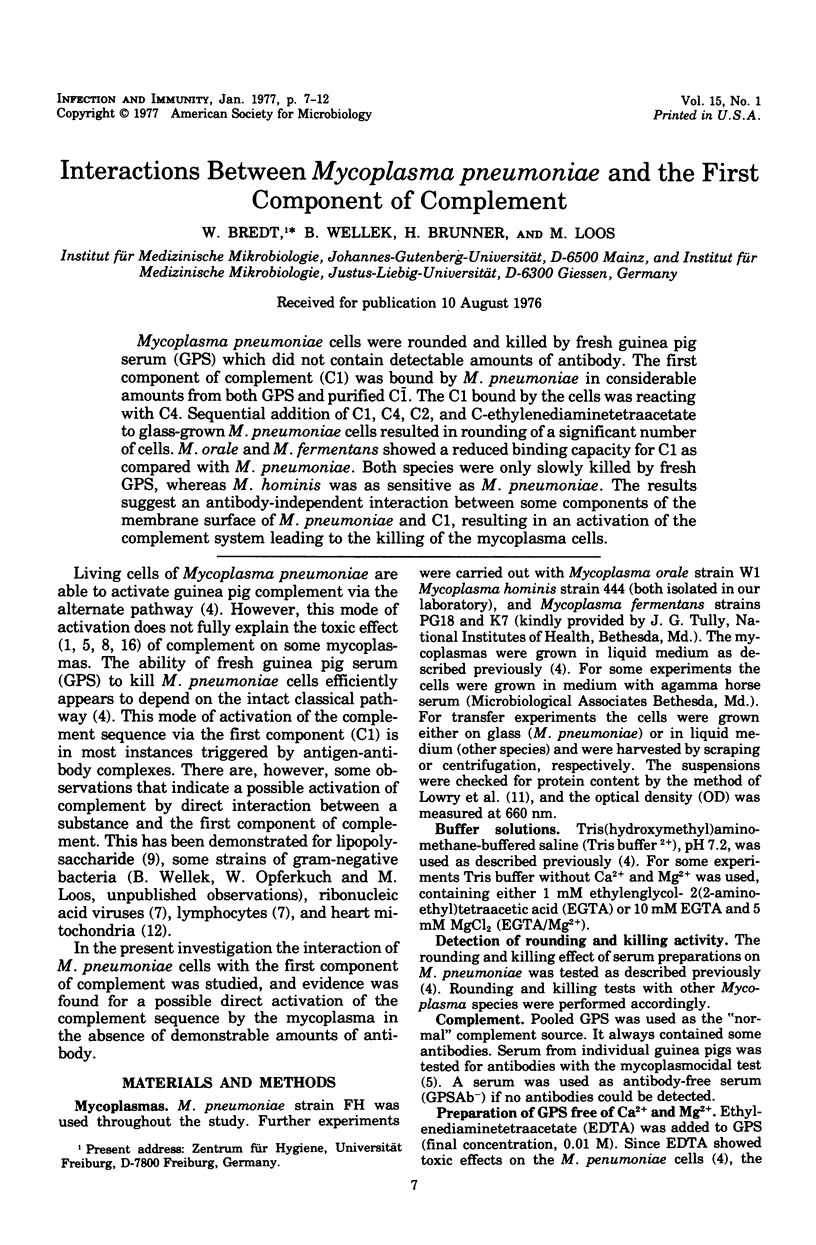
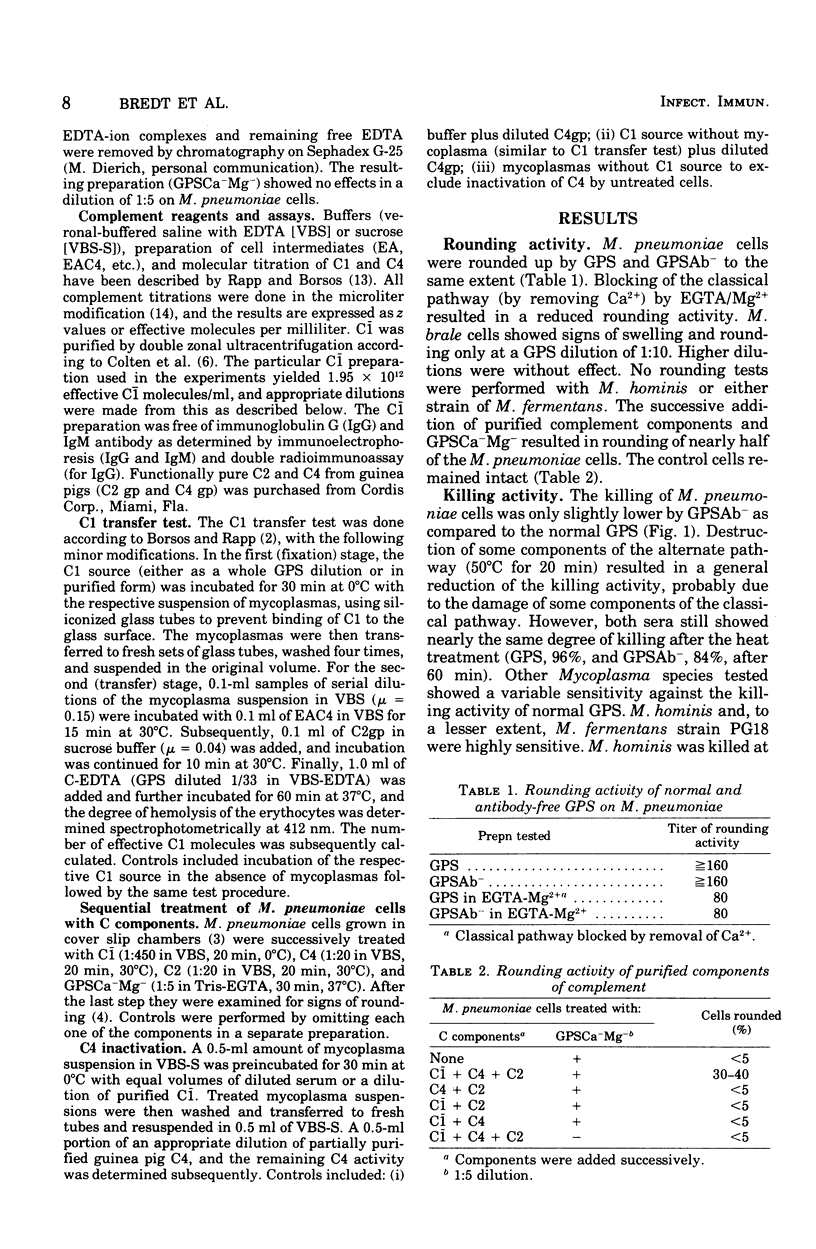
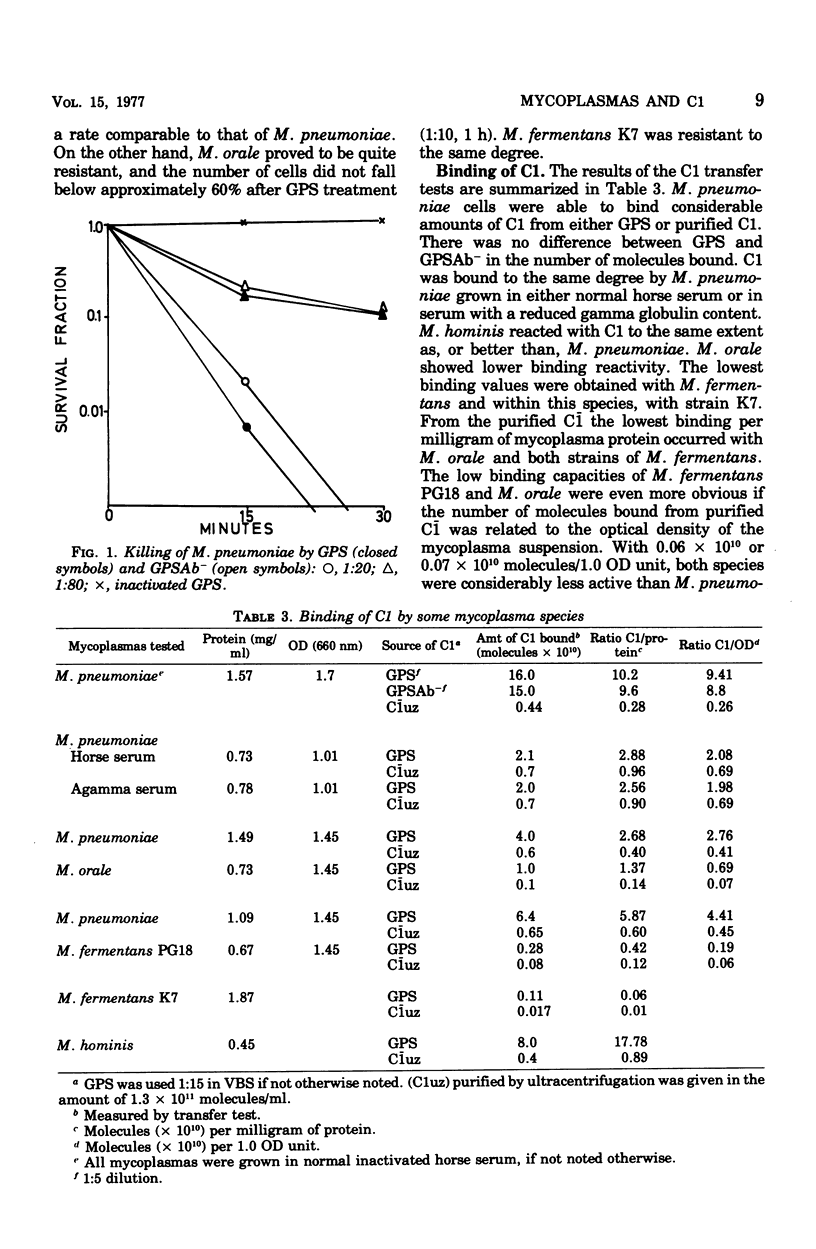
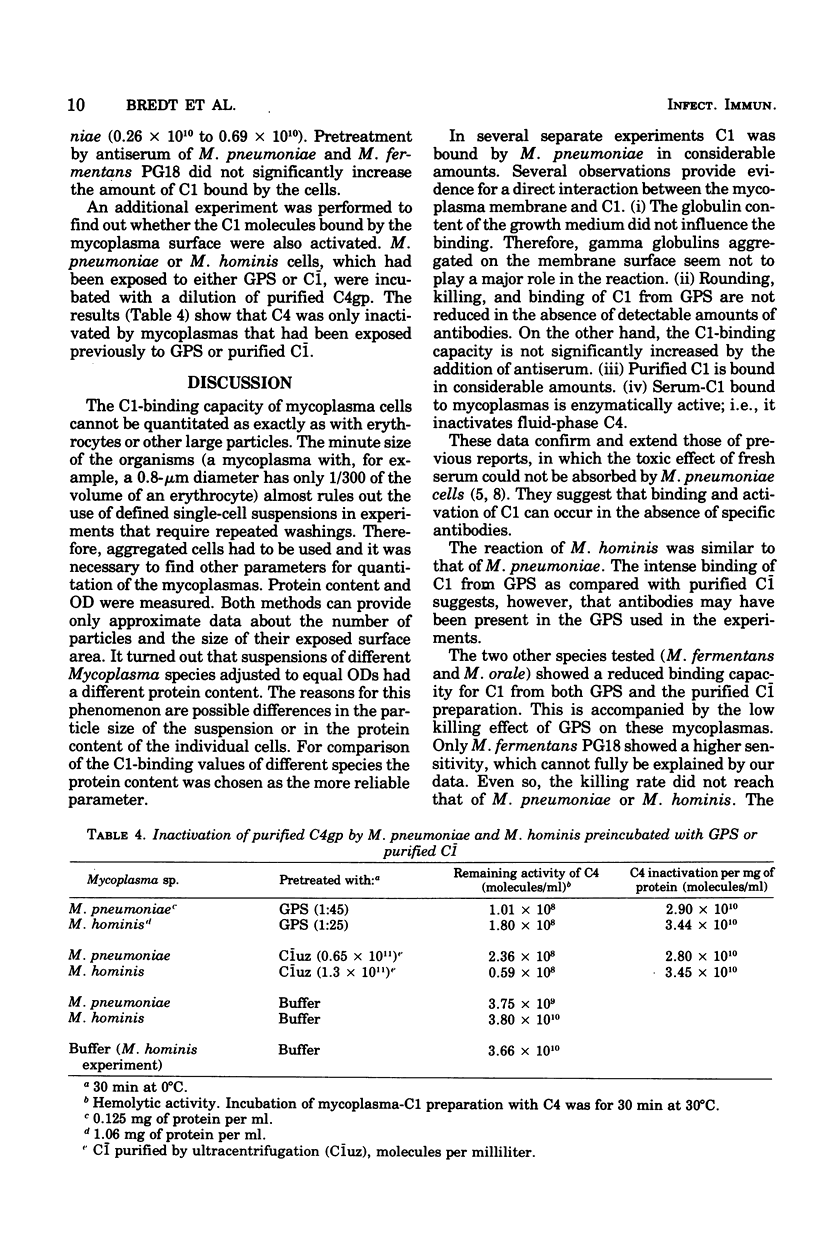
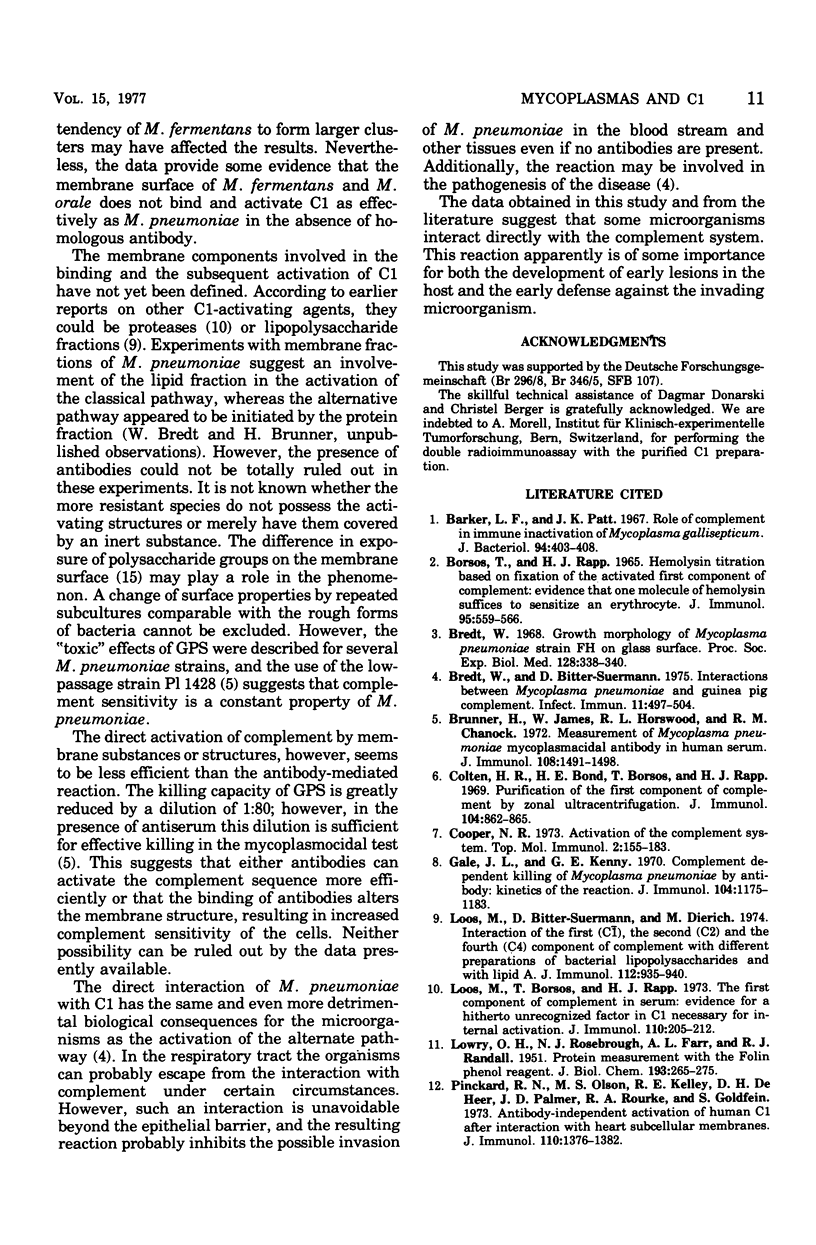
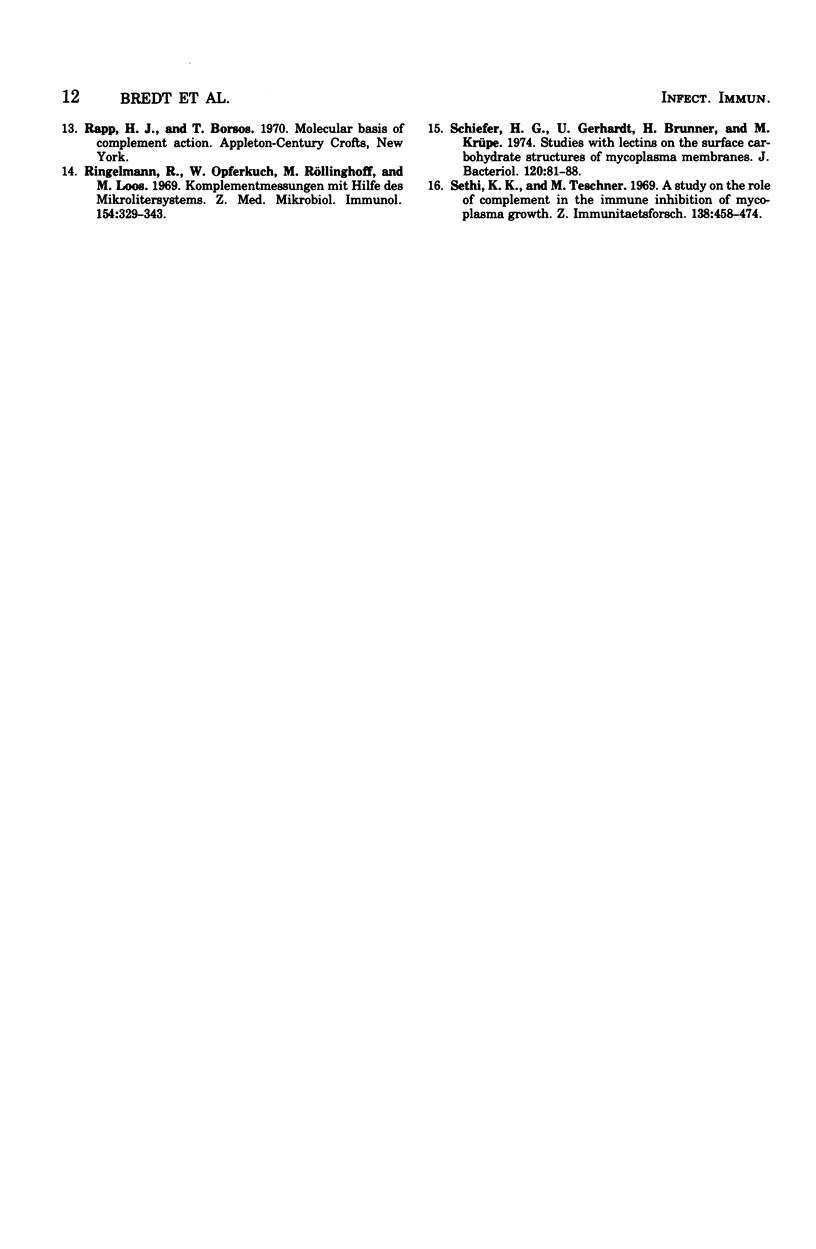
Selected References
These references are in PubMed. This may not be the complete list of references from this article.
- Barker L. F., Patt J. K. Role of complement in immune inactivation of Mycoplasma gallisepticum. J Bacteriol. 1967 Aug;94(2):403–408. doi: 10.1128/jb.94.2.403-408.1967. [DOI] [PMC free article] [PubMed] [Google Scholar]
- Borsos T., Rapp H. J. Hemolysin titration based on fixation of the activated first component of complement: evidence that one molecule of hemolysin suffices to sensitize an erythrocyte. J Immunol. 1965 Sep;95(3):559–566. [PubMed] [Google Scholar]
- Bredt W., Bitter-Suermann D. Interactions between Mycoplasma pneumoniae and guinea pig complement. Infect Immun. 1975 Mar;11(3):497–504. doi: 10.1128/iai.11.3.497-504.1975. [DOI] [PMC free article] [PubMed] [Google Scholar]
- Bredt W. Growth morphology of Mycoplasma pneumoniae strain FH on glass surface. Proc Soc Exp Biol Med. 1968 Jun;128(2):338–340. doi: 10.3181/00379727-128-33009. [DOI] [PubMed] [Google Scholar]
- Brunner H., James W. D., Horswood R. L., Chanock R. M. Measurement of Mycoplasma pneumoniae mycoplasmacidal antibody in human serum. J Immunol. 1972 Jun;108(6):1491–1498. [PubMed] [Google Scholar]
- Colten H. R., Bond H. E., Borsos T., Rapp H. J. Purification of the first component of complement by zonal ultracentrifugation. J Immunol. 1969 Oct;103(4):862–865. [PubMed] [Google Scholar]
- Cooper N. R. Activation of the complement system. Contemp Top Mol Immunol. 1973;2:155–183. doi: 10.1007/978-1-4684-7773-3_7. [DOI] [PubMed] [Google Scholar]
- Gale J. L., Kenny G. E. Complement dependent killing of Mycoplasma pneumoniae by antibody: kinetics of the reaction. J Immunol. 1970 May;104(5):1175–1183. [PubMed] [Google Scholar]
- LOWRY O. H., ROSEBROUGH N. J., FARR A. L., RANDALL R. J. Protein measurement with the Folin phenol reagent. J Biol Chem. 1951 Nov;193(1):265–275. [PubMed] [Google Scholar]
- Loos M., Bitter-Suermann D., Dierich M. Interaction of the first (C1), the second (C2) and the fourth (C4) component of complement with different preparations of bacterial lipopolysaccharides and with lipid A. J Immunol. 1974 Mar;112(3):935–940. [PubMed] [Google Scholar]
- Loos M., Borsos T., Rapp H. J. The first component of complement in serum: evidence for a hitherto unrecognized factor in C1 necessary for internal activation. J Immunol. 1973 Jan;110(1):205–212. [PubMed] [Google Scholar]
- Pinckard R. N., Olson M. S., Kelley R. E., DeHeer D. H., Palmer J. D., O'Rourke R. A., Goldfein S. Antibody-independent activation of human C1 after interaction with heart subcellular membranes. J Immunol. 1973 May;110(5):1376–1382. [PubMed] [Google Scholar]
- Ringelmann R., Opferkuch W., Röllinghoff M., Loos M. Komplementmessungen mit Hilfe des Mikrolitersystems. Z Med Mikrobiol Immunol. 1969;154(4):329–343. [PubMed] [Google Scholar]
- Schiefer H. G., Gerhardt U., Brunner H., Krüpe M. Studies with lectins on the surface carbohydrate structures of mycoplasma membranes. J Bacteriol. 1974 Oct;120(1):81–88. doi: 10.1128/jb.120.1.81-88.1974. [DOI] [PMC free article] [PubMed] [Google Scholar]
- Sethi K. K., Teschner M. A study on the role of complement in the immune inhibition of mycoplasmal growth. Z Immunitatsforsch Allerg Klin Immunol. 1969 Nov;138(5):458–474. [PubMed] [Google Scholar]


